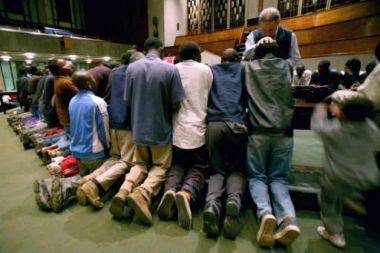Hundreds of refugees evicted from Johannesburg church

Hundreds of refugees have been evicted from a church in Johannesburg which has given sanctuary to tens of thousands, following a decision by the church's leadership.
However, they may now be found accommodation elsewhere, according to the former minister of the Central Methodist Church.
Bishop Paul Verryn was the superintendent minister of the church until last month, and had been responsible for housing approximately 30,000 homeless people there during the last six years. Around 400 Zimbabwean refugees remained at the end of the year and were locked out when it was decided that the church could no longer continue its ministry to them in the same way.
However, Verryn told Nehanda Radio that offers to held were coming in from all over the country. He said: "People offering help were calling in from Bloemfontein, Welkom, Potchefstroom, among many places. The offer for help is incredible," he said.
"Accommodation has been identified for some at a community centre in Soweto." He said he intended to inspect a building not far from the church which had been offered as accommodation for the refugees.
The church's open-door policy has long been controversial. Around 3 million people left Zimbabwe in recent years. Many made for Johannesburg and thousands were given accommodation at the church after xenophobic attacks on them in 2008 by locals who resented their presence in a country where the unemployment rate was 25 per cent.
However, the building deteriorated under the strain of their occupation. It is now reportedly in a poor condition, with lifts out of order, people sleeping in stairwells and corridors and inadequate washing and sanitation facilities.
A 2010 report raised concerns over the plight of unaccompanied children at the church, with allegations of sexual abuse. Violence and alcoholism were also features of life there, and disease including cholera was a constant threat. While local authorities and other groups argued that the church was an inappropriate place to be housing the refugees, Verryn and his supporters argued that they would face discrimination and violence if they were forced to leave and live on the streets.
The project saw successes including a health clinic, adult training workshops and a highly regarded school, which will continue.
Verryn himself was temporarily suspended by the Methodist Church in 2010 on the grounds that he had exceeded his authority but later reinstated. He will serve as a superintendent minister in Soweto and continue his anti-poverty work.











